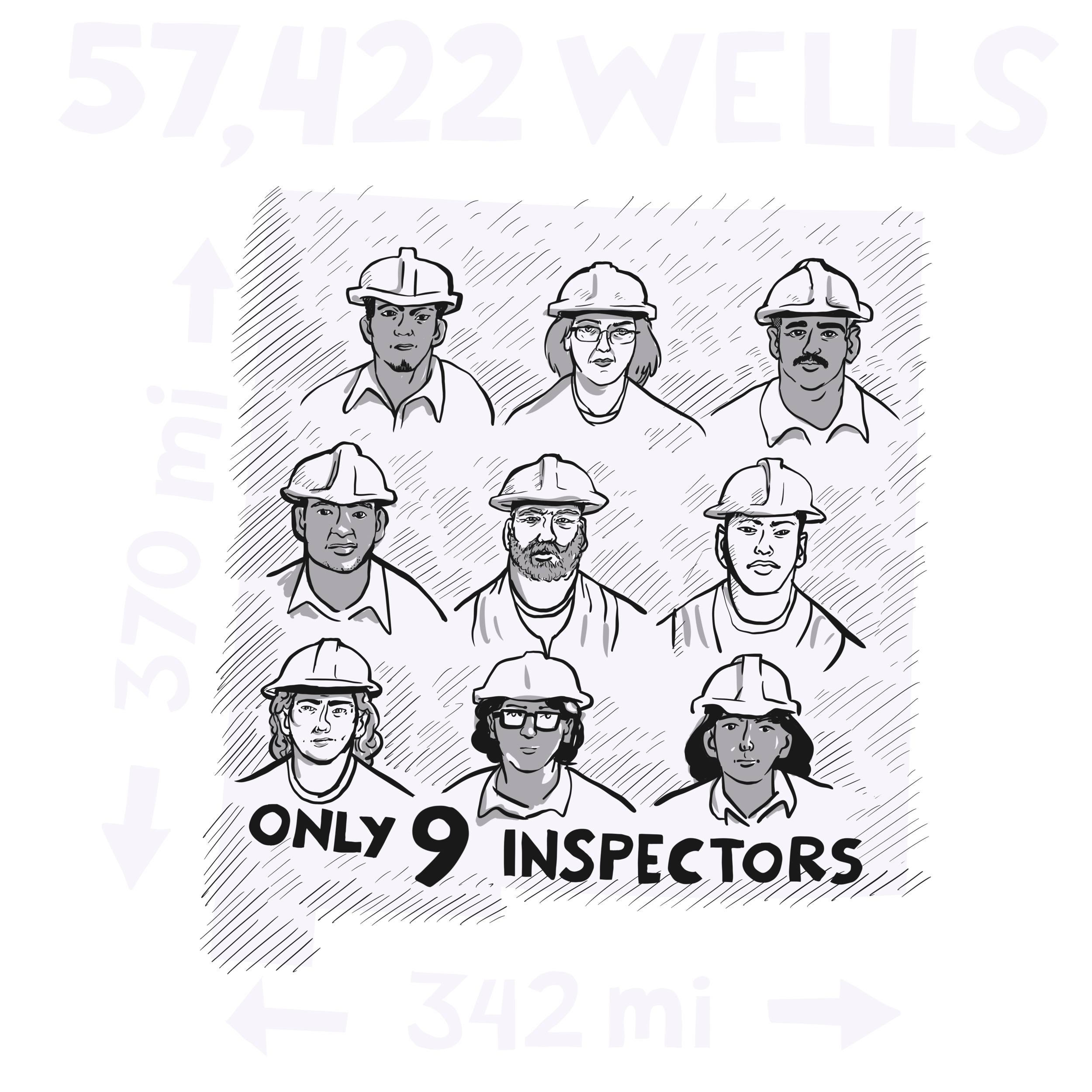Government oversight of oil and gas production in New Mexico and Texas has unambiguously failed to protect local communities’ health, and the global climate. And although New Mexico and the federal government are working on new rules, those changes won’t defuse the Permian Climate Bomb.
In Texas, oil and gas production is effectively unregulated, including in the Permian:
The Texas Railroad Commission (which regulates oil and gas, not railroads) aspires to inspect facilities only once every five years - there is only one inspector for every 1,600 oil and gas facilities, and there are more than 275,000 active oil and gas wells in Texas.
Regulator response time to pollution complaints is measured in weeks and months, not hours or days, meaning pollution can continue for at least that long.
Regulators finding pollution rarely require operators to fix it. Violations are rarely punished. Sometimes multiple violations at the same site result in facilities still polluting more than a year after pollution was initially reported.
Regulators do not always inform the public about the results of inspections, even when they result from public complaints. Instead formal Public Information Requests are required - interacting with regulators charged with protecting the public is effectively a full-time job.
Click to expand and view.
Regulators do inform *operators* when complaints have been made. In one notable case an inspector found pollution so dangerous that they immediately evacuated the site, informing the operator but *not* the resident living nearby who complained about the pollution.
69 - 84% of methane flares are unpermitted (and unknown) by Texas regulators.
Texas state leaders like it this way. As the U.S. Environmental Protection Agency (EPA) considers stronger rules that would reduce methane and toxic pollution, the Texas state government sent EPA a letter opposing them.
New Mexico’s record is barely better than Texas’. It remains to be seen if new rules will improve the situation.
The New Mexico Oil Conservation Division (OCD) - which issues permits and enforces rules related to spills, waste, venting and flaring - had only nine inspectors to govern 57,422 wells in 2020, or one inspector per 6,380 wells.
In response to public complaints, backed up with optical gas imaging videos, state regulators ignored over 55% of complaints, and didn’t bother to send an inspector.
Even when a fracking wastewater pipeline exploded, showering a family’s home and property with toxics, state regulators “were slow to respond and did little to fix the problem” - leaving the family to negotiate directly with the offending company through the courts.
New Mexico is currently considering new rules which could better protect climate and communities’ health if they are enacted and rigorously enforced. State agencies have recently become more responsive to citizen complaints.
There is no legal framework for real climate action
Even if properly enforced, neither New Mexico’s, or the EPA’s, proposed rules would defuse the Permian Climate Bomb.
That’s because no existing or proposed policy governing the oil and gas industry in the Permian, or anywhere in the United States, requires meeting the concrete carbon reduction targets necessary to limit global warming to 1.5oC and prevent climate catastrophe. In fact, nothing legally requires companies in the U.S. to meet any carbon reduction target or timeline.
The federal government has rejoined the Paris Agreement, committing the U.S. to reducing carbon emissions 50-52 percent by 2030 compared to 2005 levels. And the Biden Administration recently joined an international agreement pledging to reduce methane emissions 30 percent by 2030. But despite these very public promises, there’s no binding requirement for polluters to reduce emissions.
The absence of a regulatory framework for constraining fossil fuel production within climate limits is exemplified by the fact that a permit to drill in the Permian has never been denied.
The strongest rules currently under consideration to reduce oil and gas greenhouse gas emissions are the safeguards to cut methane, proposed in November 2021 by the U.S. EPA. Among their toughest requirements: oil and gas operators would have to perform regular Leak Detection And Repair (LDAR). Meaning the *strongest* rules would only require a company once per month to determine *if* their facility is emitting methane, never mind *how much*, *how long* or *whether it’s under a legally required limit*. Legally binding methane reduction limits would require Congressional action.
Incremental regulatory improvements like those proposed by the EPA and New Mexico are important, especially to the health of those living in the Permian. But to truly defuse the Permian Climate Bomb and maintain a safe climate, we need legislative action at the state and federal level to end permitting for oil and gas extraction and infrastructure. We need policies and funding for a managed decline of America’s fossil fuel industry, and a just and equitable transition for workers and communities impacted by an accelerated clean energy transition.
Take Action
You Can Help Defuse the Permian Climate Bomb.
Sign up to learn more about the role you can play in ending this crisis & get updates when future parts of this series are released.



